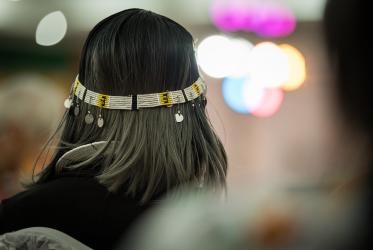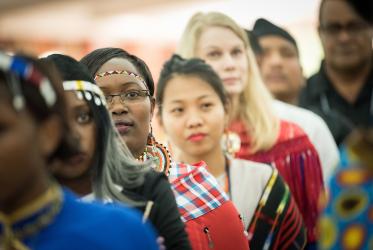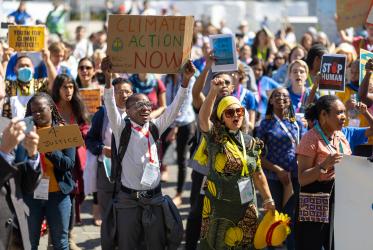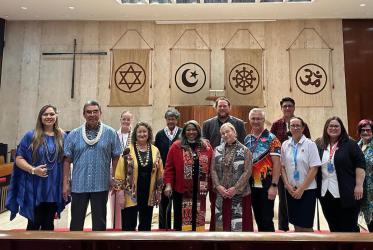My first experience with COP27 was traveling to Egypt and the bus trips around Sharm el-Sheik. They were a bit confusing, but my sense of direction helped me to find my way around the city quite fast. Visiting the Heavenly Cathedral gave me a good perspective on how it might be to live as a Christian in a country like Egypt, a lot of security involved. Finding our way through the cathedral, I was reminded that this was the land that Moses and Jesus once walked. Amazing! On a personal level this hits me real deep.
The same can be said for the events of the first day of COP27 for me. I’m moved by the words of many inspiring people that I have listened to today, most of them Indigenous themselves. First, I attended an event at the Israeli pavilion, where many representatives form different faiths were present. They told us about their different, but also in many ways, likeminded, reasoning on why the fight for climate preservation is based in faith. One of the points that hit me especially hard was that we as people of God need to take care of our brothers and sisters, not with the nature of Cain, but with the love of Abel. To care for nature is to care for each other, and vice versa. I think that if we destroy nature, nature responds with destruction in return. Extreme weather and rising sea levels causes pain and damage to our brothers and sisters around the globe and our consumerism contributes to this destruction.
Secondly, I listened to a group of Indigenous people from around the globe and the impacts of colonialism on their way of life. These were Indigenous people who represented communities that have been victimized by countries and majorities, be it the ones that occupy the lands where they live or foreign ones. Indigenous people have a way of life, a different interconnectedness, than the majority. This was shown almost too clearly by one of the panelist’s viewpoints on consumerism. He said that consumerism dictates whether an area is valuable or not, but for him the forest could not be called valuable because then you must put a value on it in the first place. He would not do that against the forest as a living, breathing entity. His spirituality and identity made the forest invaluable to him. I must say that I understand where he is coming from. As a Christian, it would concern me deeply if someone came to make profit on breaking my faith in pieces and selling it for profit and only afterwards offer me compensation, if he even offered. Some things cannot be compensated for. Some things are too sacred and important to mess with.
The point of nature having powers and meaning came across in the third event I attended as well. The theme was water and gender equality which fit this panel perfectly. There were Indigenous women from across Canada telling their stories based on water and Indigenous science. One of the women was telling us about what water means to her and her people. She had this connection to water as something more than just the H2O-molecules, but something that deserved respect, something that contains power. In my mind water in general has the same meaning for her as water that is being blessed and used for baptizing has for me, something deserving of respect, something that contains God’s grace. When new pipelines for gas and oil were being built, it did not take her source of water into consideration and the people living by and for the land had no say in the matter. The pipeline was built and damaged their sacred areas.
I hope and pray for a capable and action-heavy plan for the future, both in preventive and restorative measures from the negotiators present at COP27 and the countries in general.








